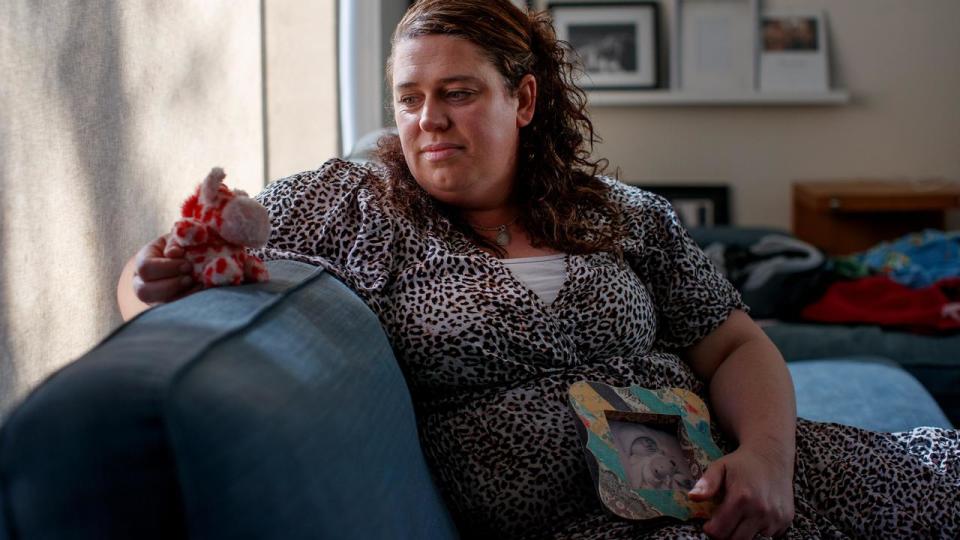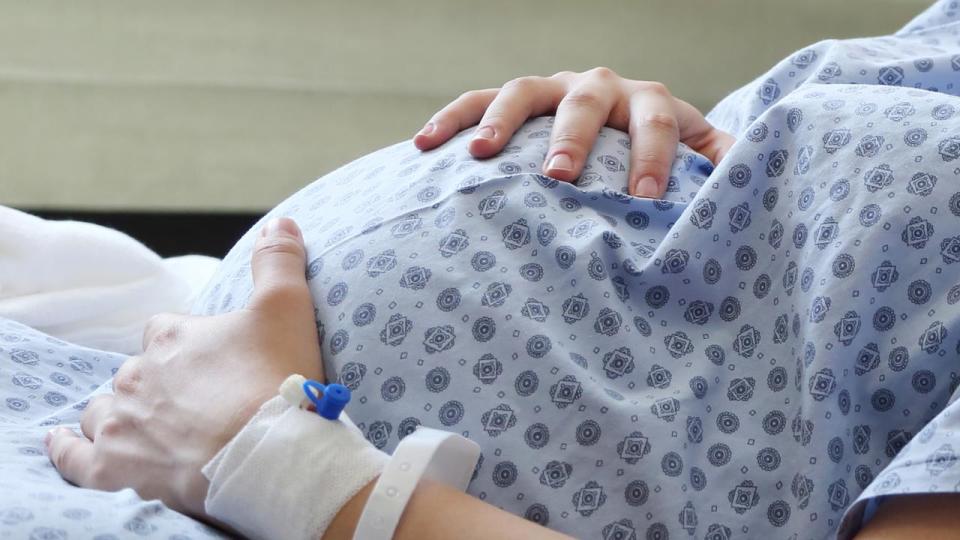Tragic story behind ‘beautiful’ baby pic

For Wollongong woman Naomi Bowden, a framed 14-year-old picture of baby Bella is one of the few photos she has of her stillborn daughter.
The picture, taken by a friend at a funeral home in 2009, shows the newborn sleeping on a sheepskin rug and cuddling a soft toy. Her small head is engulfed by a knitted hat.
Just days before, Ms Bowden had the unthinkable task of having to identify her stillborn baby just minutes before watching police put Bella into a cold, foam box.
“We got to go in and spend an hour or two with her,” she said.
“A friend of my husband’s came down and brought a little sheep’s rug and took beautiful photos.
“I’ve got those photos up everywhere. People feel uncomfortable about it, but they don’t have to live with this constantly.”
Rubbing salt into a wound that would sit raw for more than a decade, Ms Bowden was left in the maternity ward of Wollongong Hospital, listening to the sounds of other women giving birth and babies crying until she was discharged the morning after.
The emotional scar tissue was further inflamed through her treatment by hospital staff from the aftermath of her birth to her recovery.
“I just feel like it’s so unfair because if so many things were dealt with differently, I would have been a different person,” she said.
This includes an incident at her six-week post birth check-up, where doctors who hadn’t read her notes asked her where her baby was.

Prior to another consultation with hospital staff, Ms Bowden was also emailed studies from the head midwifery consultant that linked antidepressant use – which Ms Bowden had been cleared to use – to adverse effects on unborn babies.
“I was a grieving parent who was trying to put the pieces back together. Why (did I get sent) these unsupportive documents if they hadn’t even read them?” she said.
On Thursday, Ms Bowden was one of six women who gave evidence at a landmark NSW inquiry into birth trauma.
Speaking from the Sage Hotel in Wollongong, Ms Bowden choked back tears and repeated the words “I’m sorry,” as she read out her statement.
The parliamentary probe has received a record 4000-plus submissions, the majority from women who’ve shared stories of feeling ignored, unlistened to, traumatised and patronised by their birthing experience.

The co-founder of local advocacy group Better Births Illawarra, Sharon Settcase, said it was time for action.
Speaking before the committee, she called for a priority review of the risk classifications for the Midwifery Group Practice (MGP) program, which allows mothers to receive continuous care from one midwife throughout their pregnancy.
While high-risk patients aren’t able to qualify for the program, she argued that midwives were trained to look after high-risk women or refer them to other care.
“We don’t want to be called into any more steering committees to talk about the same thing,” she said on Thursday.
“There’s so much trauma. We get so many messages from women when we simply upload a photo of a beautiful birth through the MGP.”
The community advocacy group also suggested changes to ensure women were properly informed of the risks and benefits of instrumental deliveries, which may use forceps or vacuum.
“Some birth trauma comes from not knowing that information about what that is,” Ms Settcase added.

With the long-running inquiry set to continue over the next few months, the probe has put the state’s health system on notice.
In her opening statement, Illawarra Shoalhaven Local Health District chief Margot Mains issued an emotional apology to former patients, including many of the women who gave evidence earlier that day.
“On behalf of the local health district, I sincerely apologise to any woman whose care did not meet their expectations,” she said.
“I acknowledge that we need to do everything we can to ensure women don’t experience birth trauma in our hospitals.”
NSW Health Minister Ryan Park also said he was committed to “ensuring women across NSW have access to respectful, evidence-based maternity care”.
“The stories and experiences that we’re hearing through this inquiry are harrowing and difficult, but we must listen and we must learn,” he said.
“It’s important we know more about the causes and factors contributing to birth trauma and its impact on women and their families.”
Asked by the inquiry what recommendations she’d like to see made to the government and health system, Ms Bowden called for more support, respect and compassion for families going through stillbirth.
“We’re left to pick up the pieces and, in a way, do it the best way we can, but
then there’s those layers of trauma,” she said.
“I didn’t know what to expect from grief and trauma, but I can tell you that it never leaves your body.”


